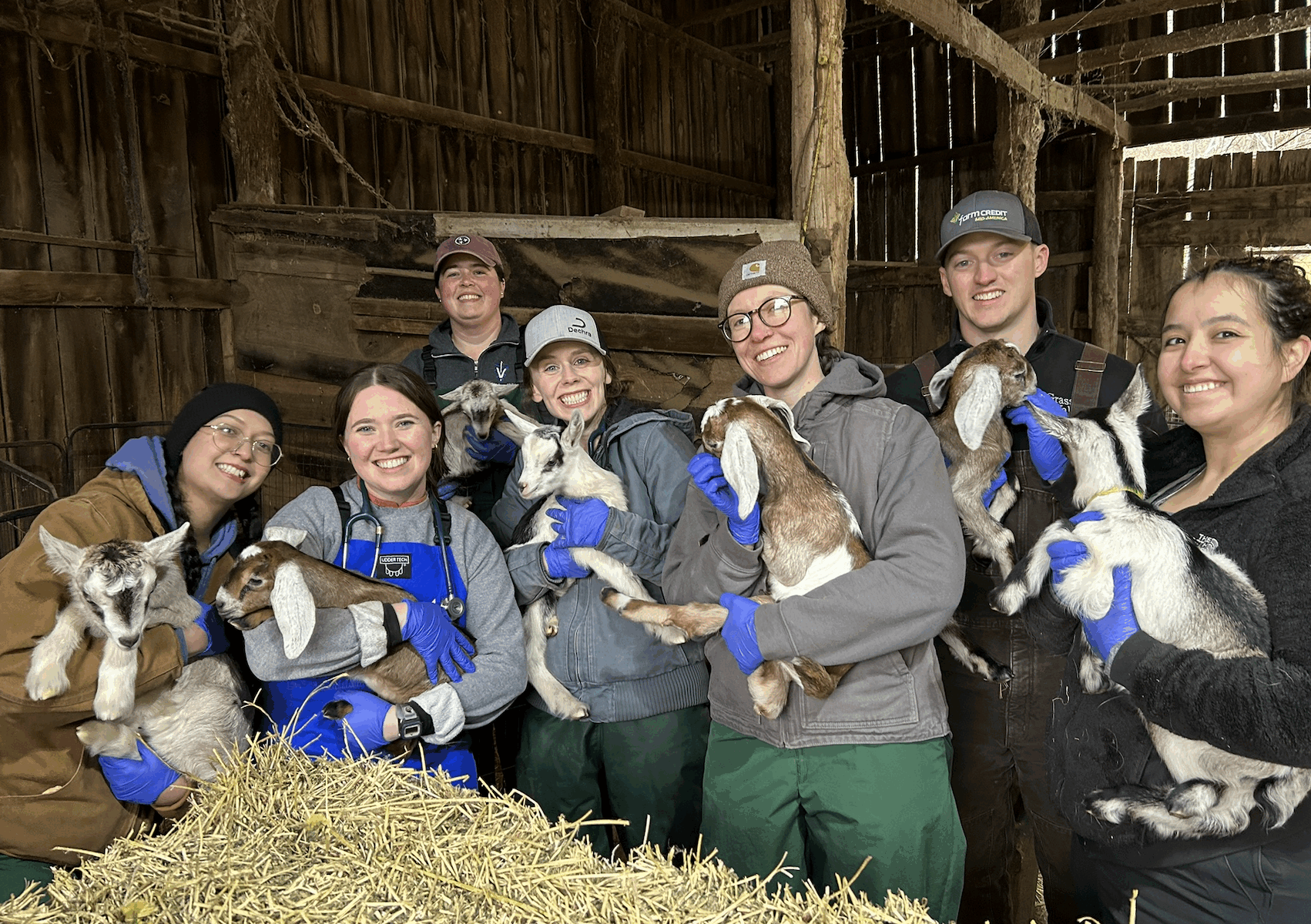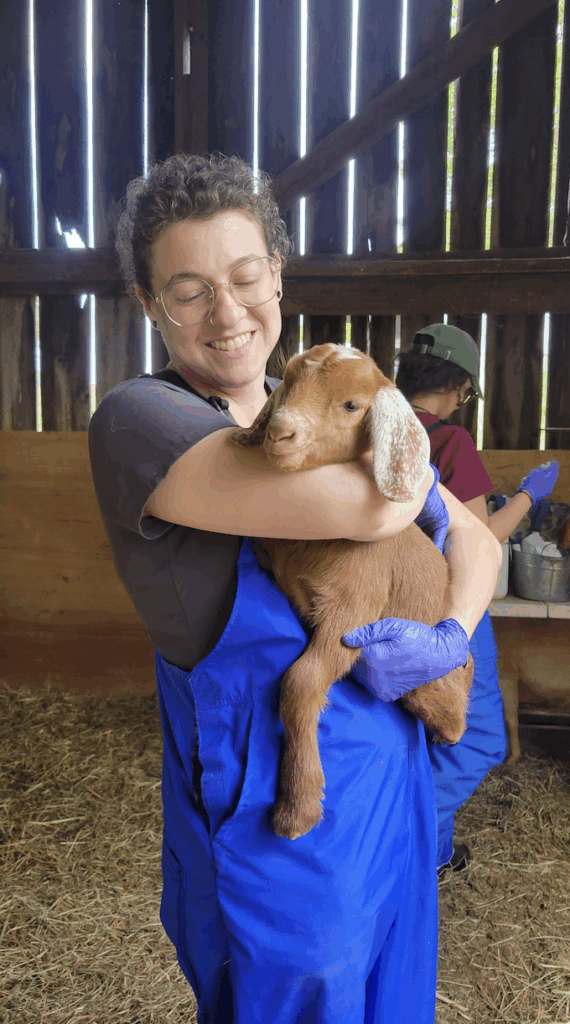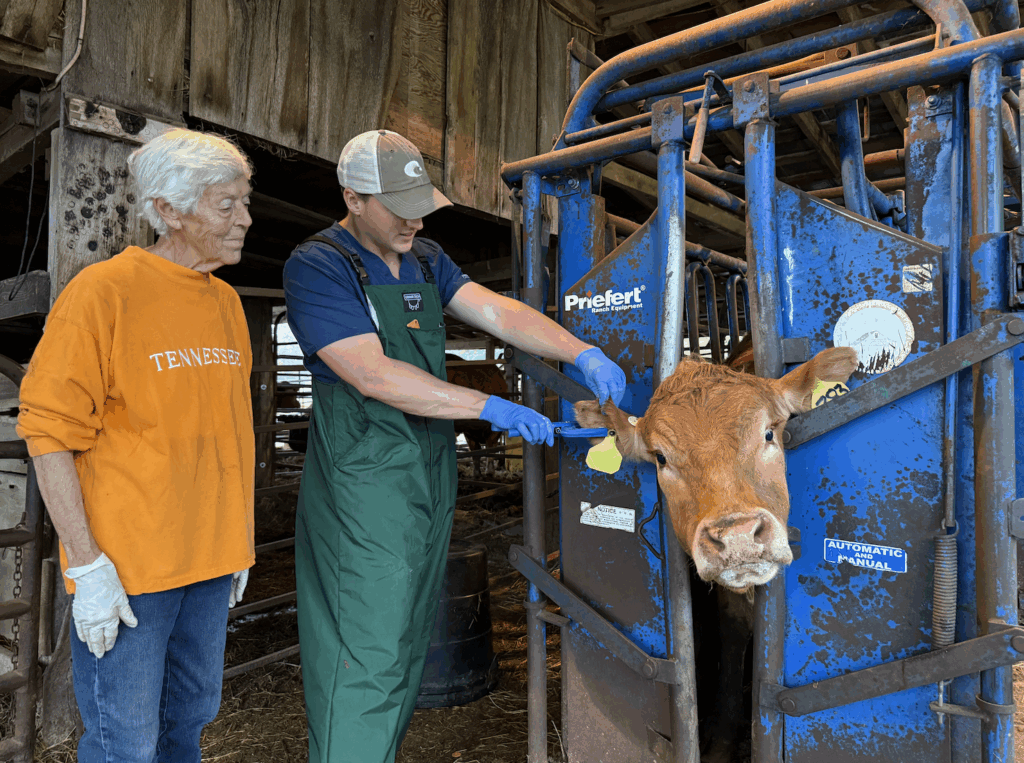
Each week four fully equipped mobile hospitals for farm animals and horses take essential veterinary care directly to the fields and farms of East Tennessee. The Farm Animal and Equine Field Services at the UT College of Veterinary Medicine provide primary ambulatory care within a forty-mile radius of the college. However, their work goes beyond medical care. It also involves building lasting relationships with farmers and their families, many of whom have been in the business for generations.
Typical Field Services Provided:
Equine and Farm Animals
- Herd Health/Production Medicine: blood work, deworming, health papers, herd disease investigations, nutrition evaluations and recommendations, vaccination
- Field Restraint: anesthesia, portable chute, etc.
- Field Medicine and Surgery: gastrointestinal, musculoskeletal, reproductive, wound management, etc.
- Reproduction: artificial insemination, assess fetal sex, breeding soundness exams, pregnancy exams (including ultrasound), etc.
- 24-Hour Emergency Care: birthing assistance, choke, colic, down animal, founder, wounds, etc.
Equine Specific Services
- Dental work, including mechanical teeth float
- Endoscopy, insurance exams
- Lameness workup, including digital X-ray capabilities
- Acupuncture

Building Relationships and Hands-On Experience
Jim and Bertha Jarnagin of Mascot, Tennessee, were among the first clients of the college’s Farm Animal Field Service. Late faculty member Robert Linnabary began visiting their farm in the 1980s when the Jarnagins had just six head of Limousin beef cattle.
Today, the Jarnagin farm is home to more than a hundred head of prized Limousins that are sold across the country and Canada, and they participate in the college’s bovine herd wellness program. Bertha says she and Jim have become friends with the veterinarians. As active supporters of 4-H club initiatives, they see the value beyond the on-site farm visits.
“We especially like the idea that, along the way, we’re helping educate the veterinary students,” Bertha says.
Comprehensive On-Farm Care and Focus on Prevention
Because the experience is valuable to all veterinarians entering the workforce, whether they choose to practice small animal, large animal, or zoo medicine, every student rotates through these core field services, gaining invaluable hands-on learning that mirrors real-world private practice. The ambulatory trucks are usually filled with a faculty member, veterinary students on their clinical rotation, and sometimes a veterinary intern and veterinary technician, enough to fill six seatbelts.
While students encounter the same species on farm visits—cattle, goats, camelids, sheep, pigs, and equids— as in the college’s veterinary medical center, generally those hospitalized cases are more complex or severe. “It’s different from when the owners bring an animal to the clinic,” says Kayla Ewing (DVM ’25). “We get to see the animals in the environment they live in, and that is so helpful.”
On the farm, students examine all aspects that contribute to the animals’ well-being. They perform thorough health checks, conduct disease outbreak investigations, diagnose and treat illnesses, administer vaccinations, and perform surgeries when necessary. They offer reproductive services like artificial insemination and pregnancy diagnosis to improve herd genetics and productivity. The services also provide emergency care 24/7.
The two field services focus on both individual animal care and production medicine to ensure all students receive well-rounded training. In the Farm Animal Field Service, clinicians and students consider the overall operation from nutrition to management of breeding and calving season, as they educate producers and help the farms become more efficient and productive. During most visits, students detail the medical work performed, the findings, and prioritize recommendations for the client. This proactive approach emphasizes prevention over treatment, aiming to identify potential issues before they escalate into significant problems.
Research Initiatives and Client Bonds
In addition to their clinical work, the college’s three Farm Animal Field Service tenure-track faculty members are heavily engaged in research. This fall, the college is poised to expand its reach by hiring an additional faculty member whose primary focus will be clinical teaching on the farm, better supporting research initiatives while maintaining high standards of veterinary care and education for farm animal species. As the demographics of the region shift from large cattle operations to more hobby farms, this growth is crucial to expose students to production medicine.
One of the unique aspects of the field services is the camaraderie and strong bond faculty and students form with clients. When working a big herd, it is not unusual for the medical team to break bread with the owners. In fact, Bertha’s desserts are legendary among veterinary students.
These bonds are vital in a region where the average age of beef farmers is 65. By fostering relationships and adapting to changing needs, the services ensure that both current and future generations of veterinarians are well prepared to meet the challenges of animal care on the farm.

Explore More on
Features
MORE FROM THIS ISSUE

















